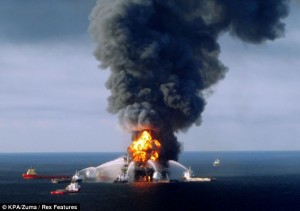 I know that our dear readers have been waiting to hear DadWagon’s reaction to the Deepwater Horizon oil spill gush, so here it is:
I know that our dear readers have been waiting to hear DadWagon’s reaction to the Deepwater Horizon oil spill gush, so here it is:
I’m for it.
Okay, not really, of course. I’ve had the good fortune to visit Plaquemines Parish and the marshes of the Lousiana bootheel after Katrina, when it was principally a nature-on-nature crime. This atrocity of neglect that the “green” energy company BP has visited on that wilderness is a scandal. But I speak now as a dad and out of supreme self-interest (nothing new there). That’s because this spill gush, as perverse as its consequences will be for Louisiana, Alabama, and the Florida Panhandle, may save the islands I grew up on—the islands that I desperately want to be a large part of my children’s lives—the Florida Keys.
President Obama, whether through some backroom deal for finance reform or just a general Democratic fecklessness, was in the process of putting his seal of approval on huge new swaths of offshore drilling from the Florida Keys on up. There were going to be rigs as close as three miles offshore, and as we’ve seen this week, this would put one of the great aquatic ecosystems of the country—the Florida Keys coral reefs—in tremendous danger.
A phone consult with my Keys-based energy policy expert (a.k.a. my mother) confirmed what I thought might be the case: people in Key West are worried that BP’s toxic effluvia may indeed drift down their way after a while. But she also saw a silver lining, a possible reversal in an anti-drilling battle that was all but lost.
So my only hope for all the roughnecks who lost their lives, and all the seabirds and Cajuns who will be whumped by the environmental disaster that followed, is that their sacrifice will at least mean that a rollback of the “Drill, baby, drill!” mindset, and that this blood-and-oil stain, as deep as it is, will be the last we’ll need to clean from the Gulf.
That, of course, would require some buy-in from Fidel Castro, too. And it would require people like this asshole to get serious about his priorities for our nation.

I read the article. How is he an asshole?
He’s an asshole because at the moment that a gajillion gallons of oil are heading toward Louisiana’s shore, he’s arguing that we should effectively place my hometown at risk of the same. I’ve got no apologies or soft words for people who would do that. –Nathan
Just curious (a little friendly debate):
1. We need oil.
2. Other countries are drilling in the exact same locations irrespective of whether we drill or not.
3. I am guessing that we have higher safety standards than most other countries in terms of drilling for oil.
4. The liberals in congress will not allow us to modernize our energy production by moving toward nuclear energy.
5. There is no political support for any type of windfarming off the Mid Atlantic or Northeast Coast.
Given those facts and others that I am clearly not equipped to argue, what would you do in terms of our need for the continuous production of oil, and not allowing that resource go to other countries?
My uninformed take:
1. We need to use less oil.
2. I don’t think other countries are drilling for oil a few miles off U.S. shores. If they were, I imagine the U.S. would have some issues with that.
3. Sure. But if those high standards produce catastrophic leaks like the BP one, then maybe those standards need to be improved first?
4. Obama just announced the pending construction of two new nuclear plants in the Southeast: http://www.salisburypost.com/Opinion/050310-edit-myturn-ty-cobb
5. The federal government just OK’d the construction of a wind farm in Nantucket Sound: <http://www.capecodonline.com/apps/pbcs.dll/section?category=SPECIAL01>.
I would agree with Matt’s points (not surprisingly, I guess), with the additional clarification that Cuba is going to be drilling on the other side of the Gulfstream from Key West, which is scary indeed. But as with any developing-world country, safety is no more or less an issue because all the drilling will be done by huge multinationals (mainly with Canadian backing). But we know how well that turned out in Louisiana, right?
Oops, lost the link from that last point: http://www.capecodonline.com/apps/pbcs.dll/section?category=SPECIAL01
This is a good read:
http://www.nytimes.com/2010/05/02/opinion/02margonelli.html
I’ve got the solution.
One word:
Unobtainium.